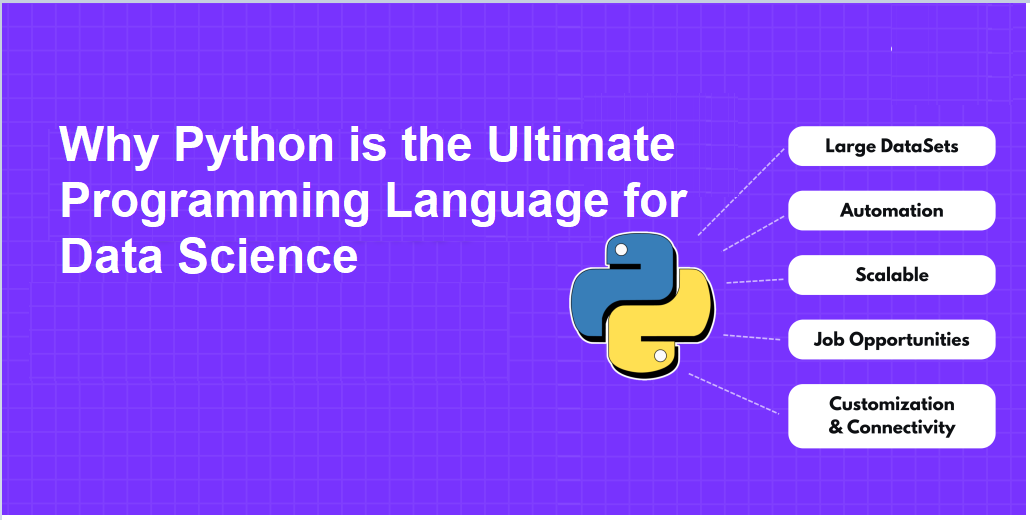Why Python is the Ultimate Programming Language for Data Science
 pallavi chauhan
pallavi chauhan
Data science is revolutionizing industries by uncovering actionable insights from raw data. To excel in this field, choosing the right programming language is crucial. Among the many options available, Python has firmly established itself as the go-to language for data science professionals. Its simplicity, versatility, and extensive ecosystem of tools make it indispensable for tackling data-related challenges. Let’s explore why Python is the ultimate choice for data science and why it’s the preferred language for both beginners and experts.
1. Simplicity and Ease of Learning
Python is widely recognized for its user-friendly syntax and readability. Its design makes it easy for beginners to grasp and enables professionals to focus on solving data science problems rather than getting bogged down by complex programming rules. For data scientists, this means they can spend more time analyzing data and less time worrying about writing the perfect code.
2. A Robust Ecosystem of Libraries
Python’s real strength lies in its powerful libraries, which simplify every aspect of data science. These libraries provide tools for handling massive datasets, creating visualizations, and building predictive models.
For example:
NumPy and Pandas are ideal for data manipulation and analysis.
Matplotlib and Seaborn are excellent for creating visual representations of data.
Scikit-learn powers machine learning, while TensorFlow and PyTorch enable advanced artificial intelligence applications.
These libraries streamline complex tasks, allowing data scientists to achieve their goals more efficiently.
3. Extensive Community Support
Python’s popularity has fostered a vast and active community of developers and data scientists. This collaborative network contributes regularly to improving Python’s features, ensuring that it stays up-to-date with the latest trends. Additionally, the community offers abundant resources like tutorials, forums, and guides, making it easier for beginners to start their journey and for experts to troubleshoot complex problems.
4. Versatility Across Platforms
Python’s ability to run seamlessly on various platforms, including Windows, macOS, and Linux, makes it a flexible option for data professionals. This cross-platform compatibility ensures that teams working in diverse environments can collaborate effortlessly, regardless of their operating systems.
5. Perfect for Data Preparation
Preparing data is often the most time-consuming step in data science. Python excels in this area by offering intuitive tools for cleaning, organizing, and transforming datasets. With Python, data scientists can handle tasks like merging datasets, filling missing values, and restructuring data with ease, ensuring they have clean and usable data for analysis.
6. Data Visualization Made Easy
Visualizing data is critical for understanding patterns and communicating insights. Python provides exceptional visualization tools that allow data scientists to create clear and impactful charts, graphs, and plots. Tools like Matplotlib and Seaborn offer customization options to present data in visually appealing and meaningful ways, ensuring that even complex datasets can be understood by a non-technical audience.
7. Driving Machine Learning and AI
Python plays a pivotal role in machine learning and artificial intelligence. Its tools and frameworks are designed to simplify the development of predictive models, helping organizations harness the power of AI. Python’s user-friendly libraries make it possible to develop, test, and deploy sophisticated models, whether for image recognition, natural language processing, or fraud detection.
8. Integration with Big Data and Cloud Technologies
With the rise of big data, the ability to process vast amounts of information is essential. Python integrates seamlessly with platforms like Hadoop and Spark, enabling data scientists to work with massive datasets. Furthermore, its compatibility with cloud platforms such as AWS, Google Cloud, and Microsoft Azure facilitates the deployment and scaling of data-driven solutions in real-world environments.
9. Widespread Industry Adoption
Python’s versatility has made it the language of choice across a range of industries, including:
Finance: For predicting market trends and detecting fraud.
Healthcare: For improving diagnostics and personalizing treatments.
Retail: For optimizing inventory and enhancing customer experience.
Transportation: For route optimization and self-driving technologies.
This broad adoption highlights Python’s importance in solving real-world problems, making it an essential tool for any aspiring data scientist.
10. Rich Learning Resources and Career Opportunities
Python’s popularity ensures a wealth of learning materials, including online courses, tutorials, and books. Aspiring data scientists can easily find resources to master Python, regardless of their skill level. Additionally, Python proficiency opens doors to high-demand career opportunities, as it is often a required skill in data science job postings.
11. Future-Proof and Innovative
Python continues to evolve, adapting to emerging trends like quantum computing, blockchain, and ethical AI. Its ability to stay ahead of technological advancements makes it a future-proof choice for data professionals, ensuring they remain competitive in a rapidly changing industry.
Conclusion
Python’s combination of simplicity, versatility, and an unmatched suite of tools has solidified its position as the ultimate programming language for data science. Whether it’s cleaning data, building machine learning models, or visualizing results, Python is an all-encompassing solution for the challenges faced by data professionals.
If you’re looking to embark on a data science journey, learning Python is the ideal first step. To help you get started, consider enrolling in the best Data Science course in Kanpur, Jaipur, Indore, Lucknow, Delhi, Noida, Gurugram, Mumbai, Navi Mumbai, Thane, and many other cities across India. These courses will provide you with the essential skills to excel in the field, ensuring you have the knowledge to tackle real-world data problems.
Consider enrolling in specialized Python for Data Science courses, like those offered by Uncodemy, to gain practical skills and unlock career opportunities in this dynamic field.
Subscribe to my newsletter
Read articles from pallavi chauhan directly inside your inbox. Subscribe to the newsletter, and don't miss out.
Written by
